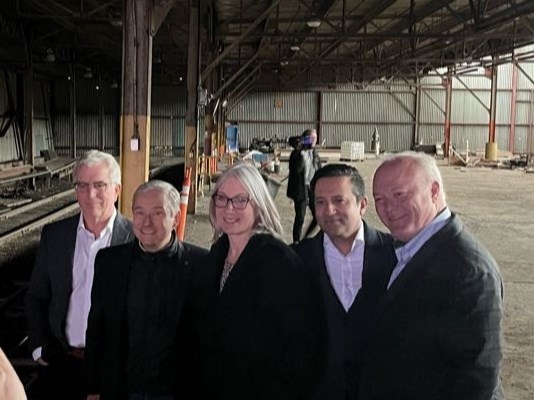THUNDER BAY — Avalon Advanced Materials Inc. has unveiled future plans for a new lithium-hydroxide processing facility on Lake Superior, with federal representatives in attendance.
Representatives from the Toronto-based lithium company were on site Thursday to greet Innovation, Science and Industry Minister Francois-Philippe Champagne and Thunder Bay-Superior North MP Patty Hajdu as well as Thunder Bay-Rainy River MP Marcus Powlowski at the former Abitibi pulp and paper mill property on Strathcona Avenue.
Previously Smurfit-Stone also operated at the site, but shuttered the mill in 2003, and the plant was subsequently demolished.
An office building and shipping-related amenities remain on the 154-hectare (383 acre) property.
“[Our] vision really [is] to be a key catalyst to invigorate the entire economy in Ontario,” said Avalon president Zeeshan Syed. “[From day one our goal has been] to accept lithium concentrates from a range of producers in the region. [We do have] a substantial amount of our own lithium deposits in the Kenora region. We have positioned that to be the initial feed, but we do believe it's the story of lifting all boats. So, we're really hopeful for future partnerships.”
In June, the company signed a binding term sheet with a Europe-based partner to expedite the development of its Northwestern Ontario lithium mineral assets, including the Separation Rapids project north of Kenora.
Syed noted that the company is looking for Ottawa’s help with some funding, solidify the supply chain and “bring value to the investments they've made in the downstream already”.
The company president also referenced the relationship with the provincial government.
“Premier [Doug] Ford has done a great job, and [Minister Vic Fedeli] in particular have really waving Ontario's flag around the world. They really took those initial steps to bring the downstream players to Ontario and they recognize the gap that's there on establishing that midstream refining capacity," Syed said. "We have been talking with Minister Fedeli, Minister [Greg] Rickford and Minister [George] Pirie. They are laser focused on achieving that objective.”
Although the company looks to redevelop an existing site in Thunder Bay, one ongoing proponent is consulting with the Indigenous population, which Syed stressed is happening.
“I have a very good line of communication with Fort William First Nation Chief Michele Solomon, [that said] there [are] going to be difficult days and difficult conversations regarding any industrial project of this scale. I'm not going to stand here and pretend that it's going to be an easy process," Syed said.
"Part of my early communication with Chief Solomon is exactly that; We'll come to council. We're going to be very transparent from day one. For Avalon, it's really about the environmental stewardship and making sure we put a premium on innovative process technology.”
Hajdu will also be keeping an eye on conversations between the company and Indigenous leaders.
“My expectation would be that any company that's at the scale of Avalon would want to be working with indigenous partners to make sure that there is a good relationship,” she said.
Early estimates indicate that the facility could be erected in early 2028 at a cost of just over $1.1 billion.
The company is also predicting the creation of approximately five hundred jobs both in Thunder Bay and in Kenora.
Powlowski feels this initiative is taking advantage of the minerals in Northern Ontario.
“This is a global race, and there are other countries that are trying to do the same things and get their lithium to markets and to refine the lithium to make those batteries,” he told reporters. “We here in Northern Ontario want to benefit from it, not just from the mining, but to be able to do some of the refining and be part of the process of building electric cars. So, this presents a tremendous opportunity for us.”
Champagne stressed that the Strathcona Avenue site has a number of advantages for expediting things forward.
“You [already] have all the utilities, electricity, gas [and] a deep sea [that is ready] to make sure you can bring the products to the market,” Champagne said. “Honestly, if I look at [possible] sites in Canada, I would say this is one of the most promising I've ever seen in terms of the possibilities.”
There are no lithium processing facilities in Ontario, forcing most of the leading lithium exploration companies in the northwest to search for funding for both mine development and the processing plant.
